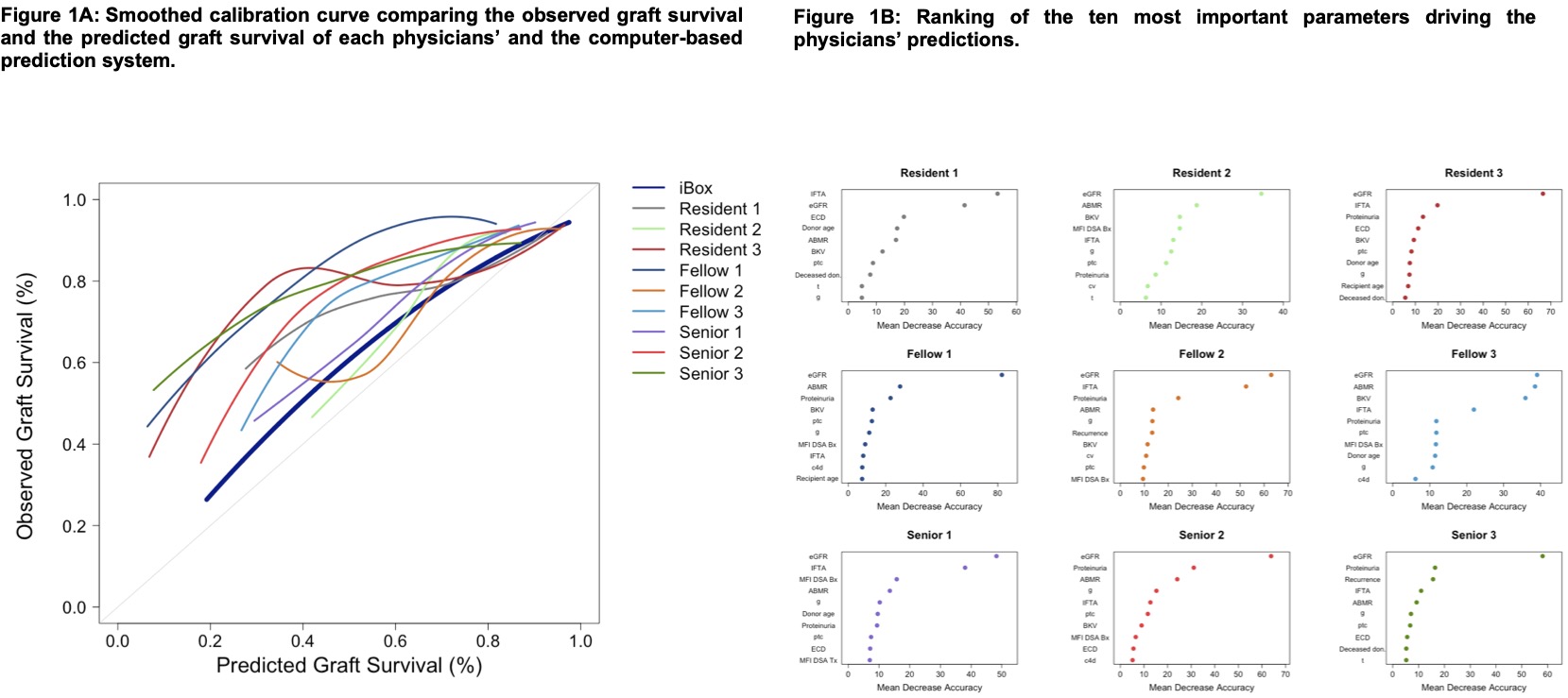Computer vs Human-Based Prediction and Stratification of the Risk of Long-Term Kidney Allograft Failure
1Paris Transplant Group, Paris, France, 2NYU Langone Health, New York, NY, 3UCLA, Los Angeles, CA
Meeting: 2022 American Transplant Congress
Abstract number: 298
Keywords: Graft survival, Kidney transplantation, Outcome, Prediction models
Topic: Clinical Science » Kidney » 46 - Kidney Complications: Non-Immune Mediated Late Graft Failure
Session Information
Session Name: Kidney Complications: Non-Immune Mediated Late Graft Failure
Session Type: Rapid Fire Oral Abstract
Date: Monday, June 6, 2022
Session Time: 5:30pm-7:00pm
 Presentation Time: 5:40pm-5:50pm
Presentation Time: 5:40pm-5:50pm
Location: Hynes Room 310
*Purpose: Clinical decision-making process after transplantation is mainly driven by patient individual risk of allograft failure prediction assessed by physicians. However, this task remains difficult and uncertain due to the integration of numerous parameters. We sought to evaluate the ability of transplant physicians to predict and stratify the risk of long-term allograft failure and compare them to a validated prediction algorithm.
*Methods: We randomly selected 400 kidney transplant recipients from a qualified dataset of 4,000 patients from the Paris Transplant Group cohort. For each patient, 44 parameters were collected during the first-year post-transplant, including donor and recipient characteristics, post-transplant parameters, and gathered into an electronic health record (EHR). We enrolled 9 transplant physicians at various career stages. At 1-year post-transplant, using the EHR, they blindly predicted the risk of long-term allograft failure with probabilities for each patient. The physician predictions were compared with those of the iBox a validated prediction system. We assessed the determinants of each physician’s prediction using random forest survival model.
*Results: Among the 400 patients included, 84 patients (21.00%) lost their kidney allograft after a mean follow-up time of 7.16 ± 3.61 years post risk evaluation. The iBox system demonstrated the best prediction performances with a discrimination of 0.79 and a percentage of median calibration error of 5.79%, while physicians tended to overestimate the risk of graft failure with lower discrimination and a higher percentage of median calibration error, respectively, with a range of 9.60% to 18.10% for residents, 8.62% to 35.87% for fellows, and 12.64% to 33.03% for seniors (Figure 1A). Physicians’ risk predictions showed wide heterogenicity with a moderate intraclass correlation of 0.58 95%CI [0.51-0.64] overall. Except for eGFR, the determinants of physicians’ prediction were disparate with a poor agreement regardless of their clinical experience: Fleiss Kappa of 0.13 (figure 1B).
*Conclusions: This study shows the overall limited performance, reproducibility and consistency of physicians to predict the risk of long-term allograft failure, who were outperformed by the iBox system in terms of prediction performances. This study supports that a companion prognostic tool may help physicians in their prognostic judgement in clinical care and decision-making process.
To cite this abstract in AMA style:
Divard G, Raynaud M, Tataputii V, Abdalla B, Legendre C, Lefaucheur C, Aubert O, Loupy A. Computer vs Human-Based Prediction and Stratification of the Risk of Long-Term Kidney Allograft Failure [abstract]. Am J Transplant. 2022; 22 (suppl 3). https://atcmeetingabstracts.com/abstract/computer-vs-human-based-prediction-and-stratification-of-the-risk-of-long-term-kidney-allograft-failure/. Accessed February 25, 2026.« Back to 2022 American Transplant Congress

